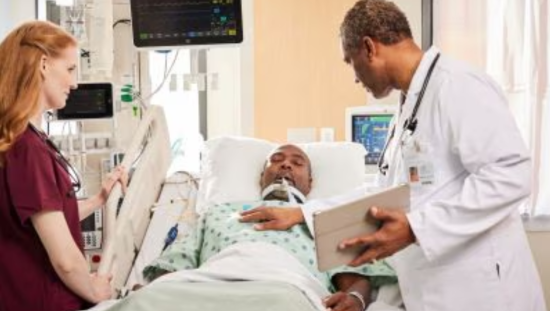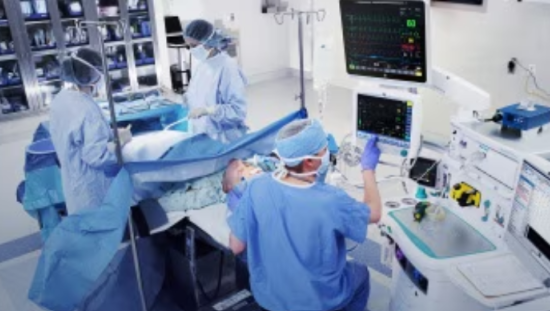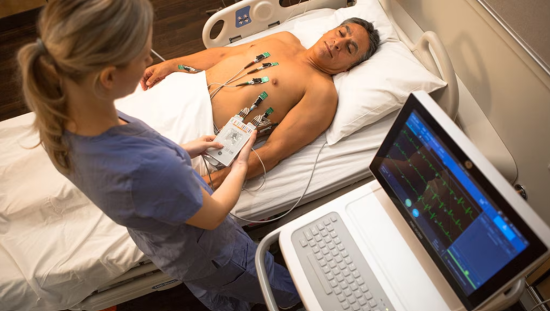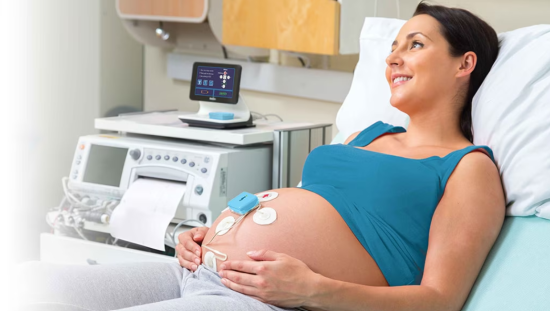The use of cardiac biomarkers in perioperative risk evaluation | ESAIC 2023
In this Top Med Talk podcast, Desiree Chappell and Andy Cumpstey speak with Michelle Chew, Academic Chair and Professor in Anaesthesiology, Intensive Care and Acute Care at Linköping University Hospital, Sweden and Giovanna Luratibuse, consultant and anesthesiology Professor at the University Hospital Düsseldorf, Germany about cardiac biomarkers.
Show Notes
Transcript
Speakers
In this Top Med Talk podcast, Desiree Chappell and Andy Cumpstey speak with Michelle Chew, Academic Chair and Professor in Anaesthesiology, Intensive Care and Acute Care at Linköping University Hospital, Sweden and Giovanna Luratibuse, consultant and anesthesiology Professor at the University Hospital Düsseldorf, Germany about cardiac biomarkers.
Top Med Talk.
Desiree Chappell: Well, hello and welcome to Top Med Talk. We are Euro-Anesthesia 2023 here in Glasgow, Scotland. It's the annual meeting for the European Society of Anaesthesiology and Intensive Care. I'm Desiree Chappell, your host, and I'm joined by my co-host, Andy Cumpstey. Hi, Andy. How are you?
Andy Cumpstey: Hi, Desiree. Nice to be here, isn't it?
Desiree Chappell: Yeah, it is. So, we've thrown you right in to be the co-host. That's good. That's right. Baptism by fire, I think, is what we like to say.
Andy Cumpstey: That's right, I believe.
Desiree Chappell: Yeah. So great conversations so far.
Andy Cumpstey: Yeah. Really interesting. Really interesting topic so far. I'm excited to see what this one's going to be as well.
Desiree Chappell: Yeah, absolutely. Well, we are here in Glasgow at Euroanesthesia 2023. I think we've been here several years in the past. Always have great conversations. And we're really excited about our next guest who is a Top Ted Talk fan fave and who has been on the podcast before, Professor Michelle Chew. Michelle, thank you so much for joining us again.
Michelle Chew: Desiree, it's an absolute pleasure to be here. And in Glasgow, when it's great weather.
Desiree Chappell: It's sunny outside. No one believes us.
Michelle Chew: It's fantastic. Nice to meet you too, Andrew.
Andy Cumpstey: Nice to meet you too.
Desiree Chappell: Michelle, so I know you have a very busy meeting. You are very busy and doing lots of sessions. You just came from a session, yeah?
Michelle Chew: Yes, that's correct. So, Giovanna and I have just released the new ESAIC focus guidelines on cardiac biomarkers.
Desiree Chappell: Oh, nice. Yeah, that's great. Well, Michelle, for all of our listeners, tell us a little bit about yourself, where are you from, and some of your research interests, and then you can introduce Giovanna here.
Michelle Chew: Absolutely. I'd love to. So, my name is Michelle Chew. I'm professor of anesthesiology, intensive care and acute medicine at Linköving University Hospital, and that's in Sweden. And my co-conversationist, I don't know if that's what you call her.
Desiree Chappell: Presenter.
Michelle Chew: Is Professor Giovanna Luratibuse. And Giovanna, you're Swiss, but you work at Dusseldorf University Hospital at the moment?
Giovanna Luratibuse: Yes, that's correct. That's correct.
Desiree Chappell: Giovanna, for our listeners, tell us just a little bit more about some of your research interests and backgrounds.
Giovanna Luratibuse: Well, I'm an anesthesiologist, and what I was confronted with at the beginning of my career was seeing patient going to non-cardiac surgery and suffering myocardial injuries or cardiovascular complications. I said this is so frequent and we have an elderly population in Switzerland. So, I wanted to tackle this question, and that is what I've been doing since 2006.
Desiree Chappell: Interesting. So, I know that there are biomarkers for post-op myocardial complications and things like that. Some of those are a little bit harder to track. Let's talk about what the problem is currently with post-anesthesia, myocardial injury, and some of those things. Michelle, I'm going to let you start us off there.
Michelle Chew: Okay, so cardiovascular complications are absolutely one of the top five complications after major non-cardiac surgery, and it's lethal. We know that many patients are subjected to major non-cardiac surgery, and we also know that the proportion of patients that already have pre-existing risk factors is just increasing and increasing. And ever since the publication of the VISION studies in 2014 and later as well, there has been an exponential rise in the number of publications just addressing this issue. We know that the increased levels of cardiac biomarkers, specifically the cardiac troponins, are associated with the risk of some poor outcome. In the VISION study, it was 30-day mortality, but lots and lots of other studies have shown how it is prognostically important not just for 30-day mortality, but major adverse cardiovascular events, longer-term mortality. There's some very good data from the Swiss group in Basel, but it's also from the UK, Gareth Auckland and his group showing that it's associated with all sorts of complications.
Desiree Chappell: Really bad outcomes.
Michelle Chew: Really bad outcomes, yes.
Desiree Chappell: And so during your presentation today, tell us a little bit about some of the things that you were able to discuss and highlight from the guidelines.
Giovanna Luratibuse: Yes, so actually, there is this exponential grow in evidence, and there are different guidelines from different countries that are offering divergent opinions. So, this is why we set out and decided to look at the literature and provide a focused guideline only on cardiac biomarkers and what was different from previous guidelines is that we looked at three different scopes of measuring biomarkers. We looked at prognosis, meaning how far can does the biomarker influence the risk? We looked at prediction, how does the biomarker help to differentiate between patients with and without outcomes? And crucially, we also looked where is the evidence in terms of improved outcome after introduction of a systematic biomarker measurement.
Desiree Chappell: That's interesting. Andy, being a recent trainee, what was that? A trainee?
Andy Cumpstey: Yeah, a trainee. Yeah, a registrar.
Desiree Chappell: A registrar. Is this something that is being talked a lot?
Andy Cumpstey: Absolutely, yeah. And I'm really fascinated in all about these guidelines. I suspect many of our listeners won't have seen these guidelines yet either, because they were very recently released, weren't they?
Giovanna Luratibuse: Yes. Yesterday.
Desiree Chappell: Yesterday, congratulations.
Andy Cumpstey: But yeah, I see this definitely every week, if not every day. There are patients asking us questions about this, but also other colleagues in the hospital asking us questions about this. What did our cardiology colleagues do when we show them a troponin 10? I want to summarize what these guidelines say.
Desiree Chappell: Yeah, do a little bit deeper dive into some of the guidelines. If we talk about risk before surgery, are there guidelines for that piece?
Giovanna Luratibuse: Yes. Actually, we looked at the whole pre-operative periods from pre-operative to post-operative, and we also looked at the changes in the concentrations of cardiac biomarkers between pre and post. Well, this is exactly what you mentioned to what are we going to do once we measure the biomarker. The ESC, the European Society of Cardiology, recently published a very nice algorithm.
Giovanna Luratibuse: At the same time, this algorithm was not based on evidence, but mostly on beliefs. What we wanted to do is not to look only at the literature that is there, but we also wanted to focus where are the knowledge gaps. We started a structured literature search, predefined the outcomes of interest in a Delphi panel, and then we went very strictly, very dogmatic along all the steps that requires implementation for producing guidelines. Well, the conclusion was surprising for both of us that the level of evidence is not as good as we believed. This was why the panel at the end decided to produce weaker recommendation than other societies do.
Desiree Chappell: Michelle, walk us through some of those guidelines. As a practicing clinician, and I'm going to go back to the OR on Monday, what are some of the big takeaways for me?
Michelle Chew: Okay, so, Giovanna already mentioned that we looked at three different scopes of interest. Number one is prognosis. Does the biomarker measurement tell you anything about risk? So that's one thing. A separate question, completely separate, is risk prediction. Does the cardiac biomarker actually differentiate between a patient that is going to get that outcome and a patient who's not going to get it? Obviously, those two areas are related, but they are separate. And then the last area is, does routine surveillance or biomarker actually help you manage your patients?
Michelle Chew: So, for prognosis, we looked at a huge number of outcomes. I think in the beginning, there were more than 30 outcomes. We voted on this in the Delphi process. It's a very strict three-part Delphi process with predefined consensus limits. So, we brought it down to 12 critical outcomes, ranging from 30-day mortality to short-term quality of life. What we found was that for prognosis, there was certainly some very good evidence that cardiac biomarkers were related prognostically to death, major adverse cardiovascular events in particular. For some of those other outcomes, there was nothing. No data on quality of life, for example. Very little data on long-term major adverse events and mortality.
Michelle Chew: For risk prediction, the data was even poorer, so there was a clear gradient. Some data and some very good data for prognosis. For risk prediction, differentiation of risk between the patient who's going to suffer that outcome and not fewer clear data. Then for biomarker and hernias management, almost no data. Our main conclusion was that if you want to use a cardiac biomarker for prognosis, to inform your patient, to inform your healthcare system, to inform your hospital, to inform clinician surgeons about whether or not to proceed to surgery to help make a better decision, by all means do that. But we could not, based on the evidence that we saw, issue a strong recommendation, so it was a weak recommendation. And remember, of course, that if you don't measure the biomarker, specifically Troponins, the likelihood is that you're not going to detect it, because myocardial injury is largely silent.
Desiree Chappell: Yes.
Michelle Chew: So, the next question will be well, if we don't measure it, are we going to detect it? So why don't we measure it? In all, the problem is that there is very little evidence that it actually helps differentiate between a patient who was going to get the disease or the poor outcome and not and there is almost no evidence to say that biomarker enhanced management actually improves outcomes. So, we're not saying don't do it, we're saying yes, use it to help your patient and your healthcare system or whatever it is, make a decision. In some situations, you may use it to improve risk prediction, but not very many. But certainly, for outcomes, there is very little data out there.
Desiree Chappell: Yeah. So, it's just more information to make well, better informed decisions, right?
Michelle Chew: Yes.
Giovanna Luratibuse: So, to support the decision process for patients and physicians. But what is, from my point of view, important, to be aware is not to focus only on what we already know and derive some decisions based on hypothesis. But we should also be very aware, very modest and acknowledge that we do not know lots of things. And this is why we issued where it was possible a weak recommendation. But we also emphasized the relevance of additional research, and we discussed where the knowledge gaps are at the moment. For example, in the etiology of myocardial injury. So, we know at an epidemiological level it's associated so it is prognostic factor, it is associated with some adverse events, but we do not actually know what is behind it.
Desiree Chappell: Yeah, it's really fascinating. We've talked a lot about this actually on Top Med Talk, men's myocardial injury after non cardiac surgery. If we do know the troponin and we do see an elevation, a slight, what do we do after surgery? And I think that's, to me, a big takeaway for this. What are you guys suggesting for more research when it comes know what we actually do with an elevated troponin if we do decide to look at that?
Michelle Chew: So, Giovanna already mentioned trying to figure out the etiology of troponin increases. The Basel group in Switzerland showed very nicely a stepwise risk increase depending on when troponin was increased or preoperative troponins versus preoperative and post operative increases versus post operative increases. So that's one way of looking at it.
Michelle Chew: The other way is looking at biological etiology. Is it ischemia is it just a leak due to some other factor? Are we measuring troponin fragments because somebody is in renal failure and that doesn't really necessarily reflect the actual injury that's already there, but previous injury. We also know that patients who have preoperative increased cardiac troponins may not have an acute injury, they might have a chronic injury. And that also entails some sort of a different level of risk. So, we need to figure out, we need to nut out all of those etiologists. So that's one thing. The second thing is what treatment we implement. There's been a lot of talk about the MANAGE trial.
Desiree Chappell: MANAGE.
Michelle Chew: Yeah. So, there was a trial amongst patients with MINS, myocardial injury after non cardiac surgery. So, it wasn't a troponin surveillance study. So among patients who have suffered MINW, if they received a bigger trend, there was evidence to show that they had a reduced risk of vascular complications in the longer term.
Andy Cumpstey: Michelle, just to clarify for our readers, when we're talking about MINS in that trial, how are they defining that in that case?
Michelle Chew: Yeah, so that's a really good question, Andy, because definitions are difficult. So MINS is myocardial injury after cardiac non cardiac surgery, and it's defined as an increase in HSTNT, high sensitivity TNT of more than five nanograms per liter or more in patients that have levels between 20 and 65, or an absolute increase that's more than 65 group.
Andy Cumpstey: They´ve one into that trial.
Michelle Chew: Correct.
Giovanna Luratibuse: And also, it has to be of presumed coronary origin. So, you have to go through an adjudication process to exclude other causes, whereas troponin, which is often measured, clinicians are facing just the troponin level. So, there is some difference. And this is also what has been done in basin to try to define the different etiologies.
Michelle Chew: Correct. And I think that's a really important and relevant pathophysiological approach. And I think one of the misunderstandings, perhaps amongst clinicians is that the inclusion criteria for the MANAGE trial kind of gets diluted. Everyone with a troponin increase somehow gets put into that group with an intent. It's really not what it is. MANAGE is a very significant study. It's the only study so far, the only randomized control trial based on an increased level of troponin postoperatively. However, it is one trial, there are many caveats to that trial. Much, much more evidence is needed. And this is the one thing that we learned from this whole process, is where the evidence gaps are.
Desiree Chappell: Is there much coming out here, coming up in the next couple of years?
Giovanna Luratibuse: Yes. So, I think the field is very alive and so I think there will be much more evidence coming out also in terms of conducting a systematic troponin surveillance, improving outcomes, and not just the question what's the effect of treating detected myocardial injury? And I think also we will have to put more efforts in going back not from the epidemiological level, back down to the pathophysiology cellular levels, and also ways to try to differentiate between those different types of injury using adapting the biomarkers, the essays for biomarkers that we are using currently.
Desiree Chappell: Wow, that's fantastic. Well, ladies, thank you so much for sitting down with us today. Sounds like we're going to be hearing more in the coming years. Where can we find the new guidelines?
Michelle Chew: So that's published ahead of print in the European Journal of Anesthesiology, which is available to all members. Actually, it's open, it's publisher open access. So, it's available. Just click on EJA and it's actually a little bit hard to find, unfortunately.
Desiree Chappell: We'll put a link to it. We'll put a link to it on the podcast and so everyone can just get it right like that.
Michelle Chew: Thank you.
Desiree Chappell: Yeah, sounds great.
Michelle Chew: Thank you for having us. It's been an absolute pleasure.
Desiree Chappell: Yeah, absolutely. Well, thank you so much for listening to Top Med Talk. You can always find us at topmedtalk.com. We are going to be live streaming over the next couple days from the meeting so you can hear more conversations just like this and follow us on social media. So, Twitter, LinkedIn, Facebook, we're there. This podcast will be out there, all the other podcasts from ESA, feel free to share that. We'll tag the recent guidelines that just came out, put those in there, make sure everyone can get a hold of those. So, congratulations on all the work that you guys are doing. One of the big things we talk about here at this meeting is patient safety, and I think this is definitely going towards that. Giovanna, I loved your opening statement about the reason why we're here today. Wanting to make a difference for patients. Absolutely. Thanks so much for listening. Cheers.
Michelle Chew: Cheers.
Top Med Talk.
Thanks for downloading Top Med Talk. Don't forget to subscribe via your podcatcher. Don't forget to check us out on social media. We're on Twitter, Facebook, LinkedIn and YouTube. And also, don't forget, Top Med Talk is the broadcasting arm of EBPOM, evidence based perioperative medicine. We'd love you to find out more about that. If you check out Ebpom.org, you can find low prices on some of the conferences we're organizing around the world. Many of them are virtual and don't even involve you leaving your own home. Check out ebpom.org now

Desiree Chappell
MOM, CRNA and Host of The Roundtable Blog
Board of Directors, American Society of Enhanced Recovery (ASER). A passionate ambassador of Enhanced Recovery and Perioperative Care. Desiree is the creator of the popular Roundtable perioperative care blog: http://periopcareblog.com/

Andy Cumpstey
Andrew Cumpstey trained in general medicine, anaesthesia and intensive care medicine in
Cambridge, Oxford and Southampton. He completed his PhD at the University of Southampton, exploring the effect oxygen therapy has on oxidative stress in major surgery and critical illness.
His research interests include improving clinical outcomes from major surgery and intensive care, translational clinical studies in oxygen physiology and therapy, and physiological changes in extreme environments.
He works clinically in the Southampton region looking after patients having all forms of major surgery or needing intensive care admission. Outside of the hospital, he regularly provides medical, safety and logistical support to expeditions visiting remote mountain and polar regions.

Michelle Chew
Michelle S Chew MBBS PhD EDA EDIC
Michelle Chew is Academic Chair and Professor in Anaesthesiology, Intensive Care and Acute Care at Linköping University Hospital, Sweden.
Professor Chew’s research interests revolve around the heart in the high-risk patient, perioperatively and during critical illness.
Additional research focuses on perioperative outcomes and echocardiography in the critically ill.
She is a member of the Swedish Perioperative Registry, the Scandinavian Clinical Practice Guidelines Committee, faculty member for the European Diploma of Advanced Echocardiography and chair-elect of the Cardiodynamics section for the European Society of Intensive Care Medicine, and faculty member of the European Society of Anaesthesiology and Intensive Care.
She has published over 150 scientific works and is a regular speaker at international meetings.
Professor Chew is also Deputy Editor-in-Chief for the European Journal of Anaesthesiology.
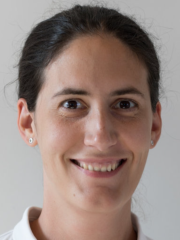
Giovanna Luratibuse
Consultant and anesthesiology Professor at the University Hospital Düsseldorf, Germany.










